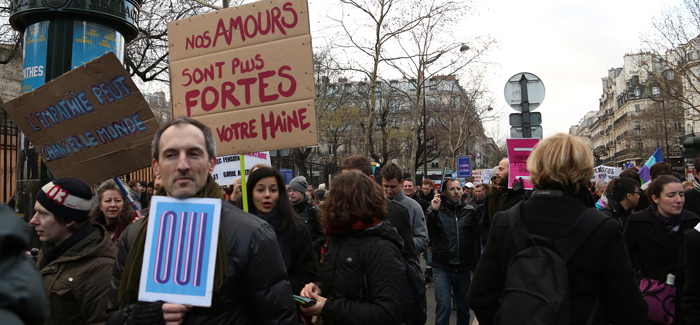
Equal rights protest in Paris, January 2013. (Photography by Paula Vélez, CC BY-NC-SA 2.0)
American Jordan Long, AM’06, joins the European struggle for gay rights.
Jordan Long, AM’06, loves “aha” moments. Like when he’s talking to a group of gay and transgender students and suddenly they begin to see how their individual struggles—against discrimination from teachers and landlords, or bullies on campus, or doctors who might out them to their parents—are part of a broader battle for human rights.
Or when he’s able to help young people who have perhaps never encountered a gay person understand that closeted sexual orientation is a secret not so different from the hard, powerful secrets they may keep in their own lives. “What if you live in a very religious community and you decide you’re not a believer anymore?” Long says. “What if your parents are getting a divorce or your sibling is really sick and you don’t want to talk about it? All these are secrets that young people carry around.”
Since 2011 Long has been programmes and policy officer for IGLYO, a Brussels-based advocacy group whose acronym stands, roughly, for the International Lesbian, Gay, Bisexual, Transgender, Queer Youth and Student Organization. Founded in 1984, IGLYO is a vast network of member organizations throughout Europe, plus a few others scattered in the Middle East, Asia, and Latin America. Primarily, IGLYO serves people under 30. “For LGBTQ youth, we don’t really have a big youth empowerment movement in the US,” says Long, who grew up in North Carolina and moved to Europe several years ago with his German boyfriend. “When it comes to employment and education and benefits and almost everything, under 30 means something different here in Europe.”
IGLYO works to get antidiscrimination laws passed through the European Union, and Long, who earned a UChicago MAPSS degree in anthropology and a JD from the University of Michigan, helps with that effort. But legislative lobbying can be slow going, especially in the EU’s unwieldy system, with member nations whose views of gay rights vary widely. Spain, Portugal, Sweden, Norway, and the Netherlands allow same-sex marriage; several European nations allow gay adoption. But other countries—among them Poland, Ukraine, Lithuania, and Belarus—have constitutional bans forbidding same-sex marriage. France’s parliament voted this year to allow gay marriage and adoption, despite protests that made global headlines.
Long’s most gratifying work is often closer to the ground, leading workshops at the three or four annual IGLYO conferences where young people with a whole range of gender, transgender, and sexual identities meet up. Daytime workshops focus on what Long calls “capacity building”: helping LGBTQ young people to understand their rights, teaching them a vocabulary to discuss the social issues they face. “They can’t talk about bullying without talking about things like personal safety and freedom of expression and freedom of assembly,” Long says. “So we give them those terms, which become civil rights terms, to talk about the actual issue.” Other times, the advice IGLYO workshops offer is purely practical. “Most European law already takes into account confidentiality, but that doesn’t mean doctors in Slovakia won’t tell someone’s parents that they have an STD or that they came out as gay in the consultation,” Long says. But if a patient understands the law, “then when they bring their health concerns to their doctor, they can say first, ‘I know you’re bound by confidentiality, and I expect you to hold to that.’”
Sometimes the young people who come to conferences are not yet out to family and friends back home. “For them, it’s often the first safe space they’ve had,” Long says. During small-group discussions in the evenings, attendees reflect on their experiences. “So that’s where someone might say, ‘It’s the first time I’ve ever been out in public. Only one person in Bulgaria knows that I’m gay.’”
The conferences are an intense few days, Long says, that can have lasting, profound effects on attendees. “Youth can be such a confusing time, and you’re trying to find a definition that makes you who you are,” he says. Being able to play a role in creating that definition, consciously and deliberately, makes a huge difference in young people’s lives. “I didn’t really have that growing up. I did it through my studies. Which is why I studied LGBT issues and LGBT empowerment. That was what I wanted to understand about myself.”
